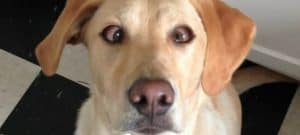Why is my Lab Hyperactive?
I have met too many hyper labradors in my lifetime—enough that it impressed on me, at a young age, how much genetics and socialization can make a HUGE difference. And in 1988 I discovered the difference between American Field Labs and English labs, and thus, made my choice to go with the English Lab, as a breeder. I’ve met wonderful American field Labs—don’t get me wrong—it’s just a generality. (For more info check out our blog “American vs English Labs”)
But research, lately, has shown that there are not only just genetic factors in play, but also very serious, yet treatable deeper issues that are caused by several physiological factors.
A Finnish study discovered these issues:
- Hyperactive/impulsive dogs have lower levels of tryptophan in their blood than normally behaved dogs
- The study also suggests there are differences in the gut bacteria of hyperactive dogs. Be sure to be giving a high-quality probiotic for dogs.
- The incidence of clinically diagnosed hyperactivity in dogs is actually quite low
- Many dogs labeled hyperactive by their owners are displaying normal, if undesirable, canine behaviors—many of which are linked to lack of mental stimulation and physical activity—or, as we know, genetics can play a role in this behavior.
- There are many things owners of very active dogs can do to redirect their pet’s energy.
One of the most important things is to ensure your Lab is receiving adequate, moderate exercise. Engaging in high-energy play and exercise may not only injure your Lab’s joints but also further encourage hyperactive behavior. So a 20-30 minute walk and canine puzzles and games can be helpful.
Some Symptoms of Hyperactivity include, but are not limited to:
-Impulsiveness
-Over-sensitivity to sensory stimulation (and continued stimulation once sensory item is removed)
-Panting, pacing, jumping on people, and constant movement
-Phobias and anxiety disorders
-Territory or Resource Guarding
-Some food intolerance or allergies
-Excessive Barking
-Counter-surfing
-Excessive whining
-Destructive behavior
There are many things that can affect your dog’s behavior, including whether she’s alone or ignored much of the time, doesn’t get adequate exercise or hasn’t received any sort of obedience training. It’s also possible you’ve unintentionally conditioned her to use physical activity to get attention (see our blog on “Why does my Lab Bark?”).
If you notice your canine family member is much easier to be around after she’s been to the dog park or has run around the backyard with your kids for an hour, you can safely conclude that burning off physical and mental energy has a positive effect on her behavior.
Dogs who don’t get their daily needs met for activity, social interaction, and mental stimulation may appear to be hyperactive as they attempt to fulfill those needs within the constraints of their environment.
A lack of essential fatty acids was also observed, which is a similar deficiency found in human Hyperactive/ADD disorders. Supplementing with a high quality Fish Oil would be advised.
And since gut health is so important to cognitive activity, a food containing a high quality, guaranteed live probiotic will help balance your Lab’s microbiome on a daily basis.
Focus on positive reinforcement and discourage negative behavior by ignoring it and not rewarding it.
Essential Oils have also been shown to be very helpful, according to Dr. Karen Becker, DVM (Mercola Healthy Pets) It is necessary to learn that applying Essential Oils to your Lab is much different than with humans, and I recommend you see a Holistic Veterinarian who is an Aromatherapist or only use oil blends developed by a Holistic Veterinarian that understands species-appropriate application and animal physiology.
Read entire clinical study here



4 Comments